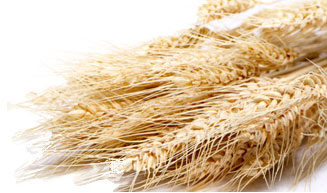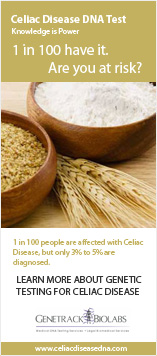Mutations in the HLA Genes

Find out if you are at risk - get tested
| TEST | TESTING TIME | PRICE |
|---|---|---|
| DNA Celiac Disease Test | 4 to 6 weeks | $249 USD |
Production of HLA Protein
The HLA genes are located on chromosome 6, and produce the HLA protein. The HLA protein is a heterodimer composed of two chains: HLA-DQA1 (the HLA alpha chain) and HLA-DQB1 (the HLA beta chain). A mutation in the HLA alpha chain (HLA-DQA1*05) in combination with a mutation in the HLA beta chain (HLA-DQB1*02) are present in 90-95% of patients with Celiac Disease. The heterodimer formed with these two mutations is called HLA-DQ2. Another mutation in the HLA beta chain (HLA-DQB1*0302) is associated with 5-10% of Celiac Disease cases. The heterodimer formed with this mutation is called HLA-DQ8.
HLA-DQA1*05
This allele, in combination with HLA-DQB1*02, results in the HLA-DQ2 haplotype. This haplotype is detected in the majority (90 to 95%) of Celiac Disease patients.
HLA-DQB1*02
Patients that are homozygous for HLA-DQB1*02 and also have HLA-DQA1*05 tend to be at greatest risk for severe complications arising from Celiac Disease (these individuals have haplotype HLA-DQ2). Possession of only HLA-DQB1*02 without DQA1*05 is indicative of only a slightly increased risk of developing Celiac Disease.
HLA-DQB1*0302
This mutation is inherited in an autosomal dominant manner, and is always inherited with other HLA-DQA1*03 alleles due to linkage disequilibrium, resulting in haplotype HLA-DQ8. This means that an individual that inherits this mutation from only one of their parents is at an increased risk of developing Celiac Disease, but the risk is lower than individuals that have the DQ2 genotype. This mutation accounts for up to 5 to 10% of Celiac Disease cases.
The presence of celiac disease-associated HLA alleles implies an increased risk for celiac disease, but is not diagnostic of celiac disease as only a subset of individuals with these alleles will develop celiac disease. However, individuals who test negative for the celiac disease-associated alleles HLA-DQA1*05, HLA-DQB1*02 and HLA-DQB1*0302 can essentially exclude a diagnosis of celiac disease and have almost no lifetime risk of developing celiac disease (less than 0.04% chance), regardless of whether or not they ingest gluten.


